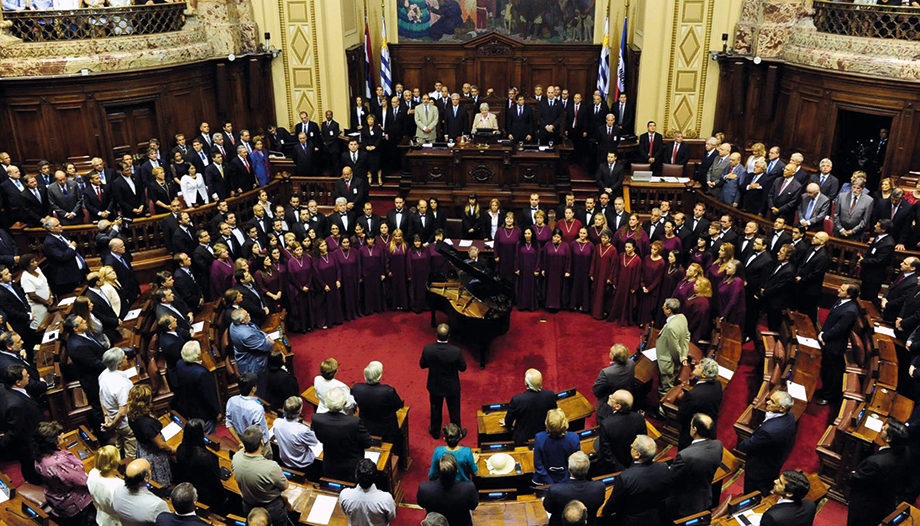The Administrative Court of Appeals (TCA) of Uruguay has issued a historic ruling for the rule of law. It has established guidelines and concepts that guarantee the free exercise of conscientious objection by health professionals. In this way, the right to conscientious objection, implicitly established in the Uruguayan Constitution, is protected. This right is expressly included, although under very special conditions, in the text of the law that currently allows the decriminalization of abortion. In Uruguay, for years the governing party (Broad Front) is trying to pass a law decriminalizing abortion. In his previous presidency (from March 1, 2005 to March 1, 2010), the current president of Uruguay, Tabaré Vázquez (reelected on March 1, 2015), vetoed a law that had been passed by the parliament, based on the scientific reality that from conception a human life exists.
Finally, in 2012, during the presidency of José Mújica, the new law in force was approved. This law presents as an exception the possibility of not penalizing the performance of an abortion. This is clearly stated in Article 2 of the law: "Voluntary termination of pregnancy shall not be penalized and consequently Articles 325 and 325bis of the Penal Code shall not be applicable, in the event that the woman complies with the requirements set forth in the following articles and it is performed during the first twelve weeks of pregnancy."
Therefore, it is currently possible to perform abortions without being penalized only when performed in accordance with the procedure and guarantees expressly provided by law and within the first twelve weeks of pregnancy.
In addition, the right of the physician to exercise conscientious objection was expressly included in Article 11 of the law. Therefore, there is no negative consequence for the conscientious objector physician to exercise a right that the law itself guarantees him/her.
One month after the enactment of the law, the Ministry of Public Health issued the decree regulating it. This decree contradicted in many aspects the particularities of the law. At its core, it illegitimately limited and restricted the right to conscientious objection on the part of physicians who did not wish to participate in the abortion procedure.
A group of physicians, who felt that the aforementioned decree violated the doctor-patient relationship and their fundamental rights to practice their profession while respecting their conscience, initiated a lawsuit to assert their rights.
Thus, in August 2015, the ATT put an end to a situation of manifest illegality and lack of certainty generated by the Ministry of Public Health in the past government period. The ATT ruling established guidelines and concepts that guarantee the free exercise of conscientious objection for health professionals as provided for in the Constitution and the law.
This is a historic resolution because, in addition to confirming the protection of freedom of conscience, it approves the existence of mechanisms for adjusting through the courts the excesses of the Executive Branch in the face of a law approved by Parliament.
The discordance between the Ministry of Public Health and the approved law regarding the scope of conscientious objection was evident. Therefore, the Ministry wanted to change the text of the law by regulatory means, incurring in a manifest illegality that led the TCA to repeal the law with general and absolute effects. In other words, it erased the contested articles from the legal system from its very inception, thus affecting not only the plaintiff physicians, but all physicians.
The judgment recognizes that the right to conscientious objection derives from the fundamental rights of the individual, both in relation to the right to freedom of conscience and the right to human dignity. The judges upheld the main points of the lawsuit.
However, during the whole period that it took for the Court's decision supporting the position of the objecting physicians to arrive, there was a lot of pressure from some authorities of the Ministry of Public Health. Physicians were labeled as false objectors or as not fulfilling their duties in the health system. Attempts were also made to give a restrictive view of the right to conscientious objection, opposing it to the supposed right of women to have an abortion. It has had such a wide repercussion in the media that in several of the country's departments and cities all the gynecologists practicing there are now conscientious objectors. Therefore, abortions cannot be performed in these places, unless the authorities send doctors willing to perform them.
In times when society wants to approve at all costs the supposed rights of some social groups, the legal system supports those who in conscience think otherwise and see their freedom violated, and taking the strength of true rights, they show that no one can demand that they renounce the inner light of their conscience.












